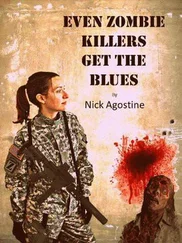If that were true, the person who called may have hoped I would do exactly what I’d done—feed the man as well as the iguana. Which would imply that he knew Gilda wouldn’t be around. Which all came back to the guard being killed and to Gilda freaking out when she learned he was dead, and to her running away with the iodine-smelling packages in the refrigerator, whatever the hell they were.
I got up, collected the clothes I’d thrown on the bathroom floor, and rifled the pockets of my jeans before I tossed them in the clothes hamper. The key ring from Ken Kurtz’s back door made a hard little thunk when I shook it into my hand. Damn, I’d forgotten to give it to him. Unless he had a spare, that meant nobody could get out the exit door from the inside. I went in the living room where I’d tossed my shoulder bag and dropped the keys in the bag. I would return them the next time I was at Kurtz’s house.
Then I went to my office-closet, where the answering machine was blinking its little red eye. The readout said I’d had four calls. As I hit PLAY to listen to the messages, I shed my terry robe and reached for a pair of clean jeans. A fuzzy Irish voice from the answering machine made me freeze with the jeans dangling from my hand.
“Good afternoon, Dixie. I’m dreadful sorry that I lied to you, but it was the only way. And now I must ask you to do something else, something very important. Please write this down and repeat it to Ken Kurtz exactly as I give it to you: Ziggy is no longer an option. You must act now. ”
I stood statue-still and stared at the machine, gripped by a strange malaise that made me unable to turn off the voice, either on the tape or in my head. It was the same man who had originally called claiming to be Kurtz.
I hit the REPEAT button. The voice said the same thing the second time, and the third and fourth. I replayed it at least a dozen times. I even wrote down every word. Then I played the other three messages while I pulled on jeans, a black T, and clean white Keds. I was stuffing the message in my pocket when I saw my forgotten underwear in the chair at the desk. Damn. Going braless is fine, I do that a lot. But wearing jeans without underwear is like sitting naked on the beach. Both take a certain masochism that I haven’t yet developed, so I took an extra two minutes to get some satin between my crotch and the denim inseam.
I would deliver the message, and then I was going to insist that Kurtz find another pet sitter to feed Ziggy. I was through with both man and beast.
As I grabbed my shoulder bag from the living room sofa, I stopped short. It was two o’clock, and I didn’t have to start my afternoon rounds for another hour. Why was I rushing? Why was I feeling an urgent need to get to Ken Kurtz and deliver the message? Why was I letting myself be used again by an unknown Irishman? Boy, talk about masochism! An inseam in the crotch is nothing compared to letting yourself be manipulated twice in twenty-four hours by a faceless voice.
I pulled out the message I’d written and read it again. Then I did what I should have done all along—I dialed Guidry’s cell phone. I had called that number so many times in my last involvement with murder that I knew it by heart. He didn’t answer, so I left a curt message.
“I have something to tell you about the guard’s murder. Please call me ASAP.”
I stuffed the note back in my pocket and went out the French doors and down the stairs to the carport. The sky was a clear expanse of blue now, all the clouds pushed away by a steady western breeze from the Gulf. A pelican stood on the shore congratulating himself on the catch in his pouch. A squadron of seagulls were flying straight into the wind like kamikaze pilots, then banking sharply and flying back to shore, arguing about who had flown the fastest before they headed out into the wind again.
I pulled the Bronco out and drove slowly down the lane so as not to alarm the parakeets, then turned north at Midnight Pass Road. I needed to talk to somebody smarter than me. That included most everybody in the world, but my actual possibilities were limited. I couldn’t talk to Michael because he would freak out. I couldn’t talk to Paco because that would put him in a position of keeping a secret from Michael, and he wouldn’t do it. I couldn’t talk to Tom Hale because he was too involved with his new girlfriend to have any energy left over for me or my problems. Cora Mathers was the only person I knew who was wise enough to give me good advice but not so emotionally close that talking to me would cause her problems.
Cora was the grandmother of a cat owner who’d got herself murdered on my watch, and Cora had sort of become a stand-in grandmother for me. She lived in the Bayfront Village, an exclusive gulfside retirement condo. Her granddaughter had plunked down an obscene amount of ill-gotten money so Cora could live in a large condo on the sixth floor where she had a view of the Gulf and the evening sunsets, but I suspected that Cora would have been just as happy in her old double-wide.
At the Bayfront Village, sliding glass doors breathed open for me, and the concierge waved to me from her desk. Chirpy as a spring robin, she trilled, “I saw you outside. I’ve already called Miz Mathers, and she said for you to go on up.”
I mouthed, “Thanks,” and threaded my way through gray-haired men and women milling around in the lobby. Some of them were smartly stepping along with tennis rackets or shopping bags in their hands, and some were stopping to take in all the Christmas and Hanukkah decorations.
A gentleman wearing bedroom slippers and cradling a teacup-sized white poodle in his arms got on the elevator with me. All the way to his floor, he talked to the poodle.
“You remember Elmer had one of those things, don’t you? He seemed to like it well enough, but I never thought it was completely safe. If there had been a power failure, Elmer could have been trapped there in that house, stuck halfway up the stairs. I’m glad we don’t have one of those, aren’t you?”
The poodle listened intently, his round black eyes fixed on the man’s face and shining with adoration. At the fifth floor, the doors opened and the man shuffled through, still talking.
“Elmer was always stubborn. He was a stubborn boy and a stubborn man. Not curious about anything, either. Not like you and me.”
The doors closed, and I was left alone to be glad I had never known Elmer.
When I got off at the sixth floor, I saw Cora down the hall waiting for me in front of her door. Just the sight of her made me feel better, maybe because Cora reminds me a little bit of my own grandmother. From the top of her downy white hair to the soles of her little feet, Cora isn’t quite five feet tall, and she weighs less than a hundred pounds. She moves in little jerky motions because her joints aren’t what they used to be, but she’s plenty active inside her head.
She hollered, “You must have smelled my chocolate bread! I just took it out of the oven.”
That made me feel better too, because Cora’s chocolate bread is Webster’s second definition of decadent . She makes it with an old bread machine her granddaughter gave her, and she won’t say what her secret is, but the result is dark and moist, with spots of yummy melted chocolate. Since I love chocolate second only to crisp fried bacon, the devil could leave a trail of it and I’d probably eat my way straight to hell.
I gave Cora a big hug, careful not to squeeze too hard and break her, and followed her half steps into her apartment. A jaunty red-berry wreath was on her front door, a sprig of mistletoe hung from the ceiling in the foyer, and a small fake Christmas tree with demented blinking lights stood in the corner of her living room. The tantalizing odor of gooey chocolate was heavy in the air, and I could hear Cora’s teakettle whistling.
Читать дальше












